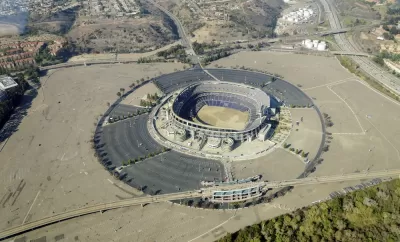While citizens of San Diego, Oakland, and St. Louis argue over whether they can afford to keep their NFL teams, overlooked are the benefits of being rid of them, writes land use attorney and San Diego Chargers fan William Adams.

Confronting the specter of losing his beloved Chargers, San Diego land use attorney Bill Adams, looks on the bright side, writing:
"Every report or statement by public officials seems to be based on the assumption that keeping the NFL team is an economic and cultural benefit to the city. Much has been written about the public costs and dubious benefits of building stadiums to benefit professional sports teams. Little has been written about the benefits of losing a professional sports franchise beyond what is implicit in avoiding the pitfalls of building a new stadium. In fact, losing the team may have several tangible and intangible benefits to a city: . . ."
He goes on to explain, 3/4 seriously and 1/4 in jest. Included in his list of benefits are more support for local college teams, better use of the land, less demand for parking, and better personal use of time. At the end of the article he describes the stadium proposal that could get his support.
FULL STORY: Five reasons losing an NFL team is good for a city.

Planetizen Federal Action Tracker
A weekly monitor of how Trump’s orders and actions are impacting planners and planning in America.

Maui's Vacation Rental Debate Turns Ugly
Verbal attacks, misinformation campaigns and fistfights plague a high-stakes debate to convert thousands of vacation rentals into long-term housing.

Restaurant Patios Were a Pandemic Win — Why Were They so Hard to Keep?
Social distancing requirements and changes in travel patterns prompted cities to pilot new uses for street and sidewalk space. Then it got complicated.

In California Battle of Housing vs. Environment, Housing Just Won
A new state law significantly limits the power of CEQA, an environmental review law that served as a powerful tool for blocking new development.

Boulder Eliminates Parking Minimums Citywide
Officials estimate the cost of building a single underground parking space at up to $100,000.

Orange County, Florida Adopts Largest US “Sprawl Repair” Code
The ‘Orange Code’ seeks to rectify decades of sprawl-inducing, car-oriented development.
Urban Design for Planners 1: Software Tools
This six-course series explores essential urban design concepts using open source software and equips planners with the tools they need to participate fully in the urban design process.
Planning for Universal Design
Learn the tools for implementing Universal Design in planning regulations.
Heyer Gruel & Associates PA
JM Goldson LLC
Custer County Colorado
City of Camden Redevelopment Agency
City of Astoria
Transportation Research & Education Center (TREC) at Portland State University
Jefferson Parish Government
Camden Redevelopment Agency
City of Claremont




























